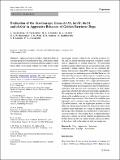| dc.contributor.author | van den Berg, L. | |
| dc.contributor.author | Vos-Loohuis, M. | |
| dc.contributor.author | Schilder, M. B. H. | |
| dc.contributor.author | van Oost, B. A. | |
| dc.contributor.author | Hazewinkel, H. A. W. | |
| dc.contributor.author | Wade, C. M. | |
| dc.contributor.author | Karlsson, Elinor Kathryn | |
| dc.contributor.author | Lindblad-Toh, K. | |
| dc.contributor.author | Liinamo, A. E. | |
| dc.contributor.author | Leegwater, P. A. J. | |
| dc.date.accessioned | 2013-10-24T20:34:07Z | |
| dc.date.issued | 2007 | |
| dc.identifier.citation | van den Berg, L., M. Vos-Loohuis, M. B. H. Schilder, B. A. van Oost, H. A. W. Hazewinkel, C. M. Wade, E. K. Karlsson, K. Lindblad-Toh, A. E. Liinamo, and P. A. J. Leegwater. 2007. Evaluation of the Serotonergic Genes htr1A, htr1B,htr2A, and slc6A4 in Aggressive Behavior of Golden Retriever Dogs. Behavior Genetics 38(1): 55-66. | en_US |
| dc.identifier.issn | 0001-8244 | en_US |
| dc.identifier.uri | http://nrs.harvard.edu/urn-3:HUL.InstRepos:11211546 | |
| dc.description.abstract | Aggressive behavior displays a high heritability in our study group of Golden Retriever dogs. Alterations in brain serotonin metabolism have been described in aggressive dogs before. Here, we evaluate whether four genes of the canine serotonergic system, coding for the serotonin receptors 1A, 1B, and 2A, and the serotonin transporter, could play a major role in aggression in Golden Retrievers. We performed mutation screens, linkage analysis, an association study, and a quantitative genetic analysis. There was no systematic difference between the coding DNA sequence of the candidate genes in aggressive and non-aggressive Golden Retrievers. An affecteds-only parametric linkage analysis revealed no strong major locus effect on human-directed aggression related to the candidate genes. An analysis of 41 single nucleotide polymorphisms (SNPs) in the 1 Mb regions flanking the genes in 49 unrelated human-directed aggressive and 49 unrelated non-aggressive dogs did not show association of SNP alleles, genotypes, or haplotypes with aggression at the candidate loci. We completed our analyses with a study of the effect of variation in the candidate genes on a collection of aggression-related phenotypic measures. The effects of the candidate gene haplotypes were estimated using the Restricted Maximum Likelihood method, with the haplotypes included as fixed effects in a linear animal model. We observed no effect of the candidate gene haplotypes on a range of aggression-related phenotypes, thus extending our conclusions to several types of aggressive behavior. We conclude that it is unlikely that these genes play a major role in the variation in aggression in the Golden Retrievers that we studied. Smaller phenotypic effects of these loci could not be ruled out with our sample size. | en_US |
| dc.description.sponsorship | Organismic and Evolutionary Biology | en_US |
| dc.language.iso | en_US | en_US |
| dc.publisher | Springer US | en_US |
| dc.relation.isversionof | doi://10.1007/s10519-007-9179-7 | en_US |
| dc.relation.hasversion | http://www.ncbi.nlm.nih.gov/pmc/articles/PMC2226021/pdf/ | en_US |
| dash.license | LAA | |
| dc.subject | dog | en_US |
| dc.subject | aggression | en_US |
| dc.subject | serotonin | en_US |
| dc.subject | candidate gene | en_US |
| dc.subject | linkage | en_US |
| dc.subject | association | en_US |
| dc.title | Evaluation of the Serotonergic Genes htr1A, htr1B, htr2A, and slc6A4 in Aggressive Behavior of Golden Retriever Dogs | en_US |
| dc.type | Journal Article | en_US |
| dc.description.version | Version of Record | en_US |
| dc.relation.journal | Behavior Genetics | en_US |
| dash.depositing.author | Karlsson, Elinor Kathryn | |
| dc.date.available | 2013-10-24T20:34:07Z | |
| dc.identifier.doi | 10.1007/s10519-007-9179-7 | * |
| dash.contributor.affiliated | Karlsson, Elinor K | |


